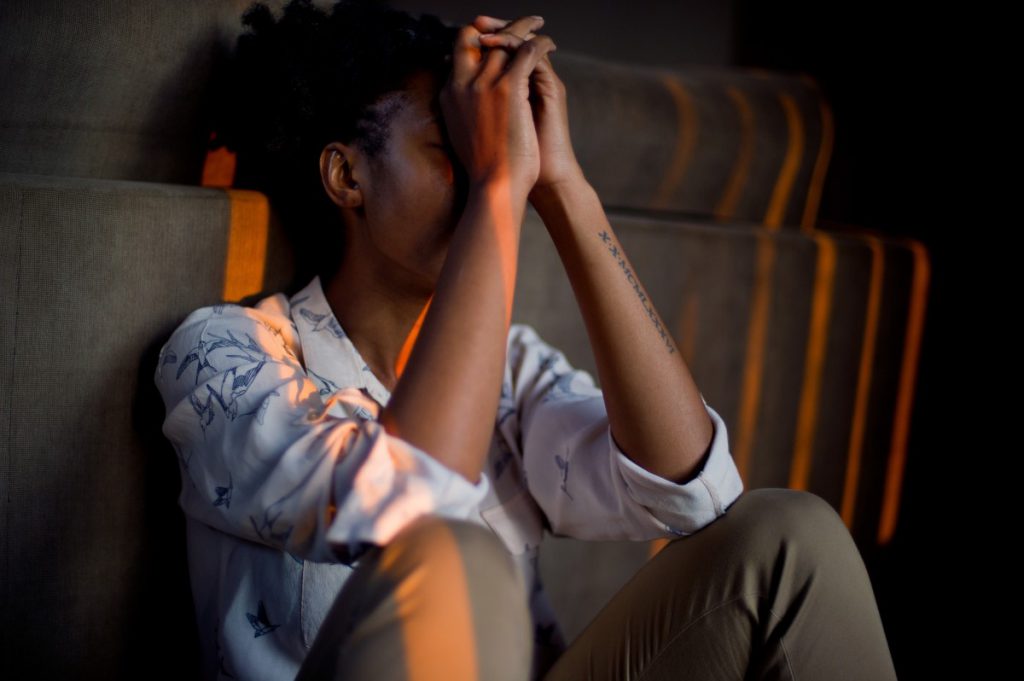Pandemic, Protests Contributing to Mental Health Crisis
Mental health professionals are seeing more cases of depression and anxiety.
Shannon Boone is used to being mindful about her mental health. The 48-year-old goes to therapy once a week to deal with anxiety and depression.
But COVID-19 has created challenges she’s never faced before.
Working from home was tough as was adjusting to a life of minimal face-to-face interactions, something she’s cherished in her role as director of real estate development for the nonprofit Layton Boulevard West Neighbors. During online Zoom meetings with her co-workers she cried.
“Most everyone else has the chance to process their thoughts with someone before they went to bed or had dinner,” Boone said. “I was processing things with them because they were almost the only ones I talked to.”
Boone is far from alone in her struggles. According to data from the Household Pulse Survey, 26.7 percent of those surveyed in Wisconsin reported symptoms of anxiety or depressive disorder over the past seven days, compared to 30.6 percent for all Americans. The U.S. Census Bureau and the National Center for Health Statistics created the survey to track weekly changes in mental health, among other subjects.
When broken down by race, 32 percent of Hispanics and 33.8 percent of Blacks reported symptoms of anxiety or depression between May 28 and June 2, the week large-scale protests related to George Floyd’s death broke out across the nation.
“We recognize that this is an important and emotional time,” said Crystal Simpson, manager of the Behavioral Health Clinic at Outreach Community Health Centers, 210 W. Capitol Drive. “The stress of the pandemic, coupled with everything else, may have pushed people into behaviors that are not healthy.”
‘I just felt lost’

Madia “Cyn” Norton was diagnosed with depression in her 20s. “Don’t give up and utilize any resources that are put into their path, because you never know what is going to help you,” she advises. Photo provided by Madia “Cyn” Norton.
Creating artwork, dancing, cooking healthy meals and staying active on social media helped Madia “Cyn” Norton, 40, ride out the initial stages of the pandemic. But for Norton, who was diagnosed with depression in her 20s and has leaned on spirituality to stabilize her life in recent years, things suddenly changed.
“I remember the day that it shifted. I just felt lost,” said Norton, who worked as a sexual health educator until being laid off during the pandemic. “I could barely move and couldn’t eat for days.”
Simmone Kilgore, a mental health specialist and trauma therapist who works with domestic violence victims through Aurora Health Care’s Healing and Advocacy Services and as a consultant for the Milwaukee Health Department’s Office of Violence Prevention, said many of her clients are struggling.
“When things change like that and we feel like we lose control, we tend to feel angry or anxious,” Kilgore said. “You throw in job loss, fear of getting sick, isolation and the uncertainty of what will happen next and people are overwhelmed.”
Both Kilgore and Simpson have treated patients during the pandemic via Zoom, although both have seen patients in-person as well. Simpson said she tries to help patients become aware their triggers are and create healthy plans to manage them.
“It’s definitely something we can support through therapeutic sessions,” said Simpson, whose clinic does not require insurance, charges on a sliding scale and provides benefits specialists to work with patients.
Kilgore said she encourages individuals to utilize meditation techniques related to mindfulness.
“It’s really about being in the moment as much as you can and being thankful and grateful about where you are without overthinking the next day,” Kilgore said.
Boone and Norton have been coping in different ways. Boone walks two miles daily with her neighbor, watches less TV and continues her therapy. As for Norton, the protests have had an empowering effect on her.
“It’s never felt so good to be a black woman and to feel like you can express and have a voice,” she said.
Norton said another thing that’s helped is the realization that she’s not going through this alone.
She offers this advice to others.
“Don’t give up and utilize any resources that are put into their path, because you never know what is going to help you,” she said.
This story was originally published by Milwaukee Neighborhood News Service, where you can find other stories reporting on fifteen city neighborhoods in Milwaukee.
More about the 2020 Racial Justice Protests
- Plea Agreement Reached On Long-Pending Sherman Park Unrest Charges Involving Vaun Mayes - Jeramey Jannene - Oct 17th, 2024
- Rep. Ryan Clancy Settles With City Following 2020 Curfew Arrest - Jeramey Jannene - Dec 12th, 2023
- Supervisor Clancy Applauds Settlement in Clancy vs. City of Milwaukee - State Rep. Ryan Clancy - Dec 12th, 2023
- Tosa Protest Assails Federal Court Decision Exonerating Police - Isiah Holmes - May 9th, 2023
- Wauwatosa ‘Target List’ Trial Begins - Isiah Holmes - May 3rd, 2023
- Shorewood Spitter Found Guilty For 2020 Protest Confrontation - Jeramey Jannene - Apr 20th, 2023
- City Hall: City Will Pay 2020 George Floyd Protester $270,000 - Jeramey Jannene - Feb 14th, 2023
- Tosa Protest Tickets Dismissed - Isiah Holmes - Jul 21st, 2022
- Op Ed: ‘We Need More’ - Charles Q. Sullivan - Mar 4th, 2022
- Milwaukee Officers Circulate “2020 Riot” Coins? - Isiah Holmes - Nov 14th, 2021
Read more about 2020 Racial Justice Protests here
More about the Coronavirus Pandemic
- Governors Tony Evers, JB Pritzker, Tim Walz, and Gretchen Whitmer Issue a Joint Statement Concerning Reports that Donald Trump Gave Russian Dictator Putin American COVID-19 Supplies - Gov. Tony Evers - Oct 11th, 2024
- MHD Release: Milwaukee Health Department Launches COVID-19 Wastewater Testing Dashboard - City of Milwaukee Health Department - Jan 23rd, 2024
- Milwaukee County Announces New Policies Related to COVID-19 Pandemic - County Executive David Crowley - May 9th, 2023
- DHS Details End of Emergency COVID-19 Response - Wisconsin Department of Health Services - Apr 26th, 2023
- Milwaukee Health Department Announces Upcoming Changes to COVID-19 Services - City of Milwaukee Health Department - Mar 17th, 2023
- Fitzgerald Applauds Passage of COVID-19 Origin Act - U.S. Rep. Scott Fitzgerald - Mar 10th, 2023
- DHS Expands Free COVID-19 Testing Program - Wisconsin Department of Health Services - Feb 10th, 2023
- MKE County: COVID-19 Hospitalizations Rising - Graham Kilmer - Jan 16th, 2023
- Not Enough Getting Bivalent Booster Shots, State Health Officials Warn - Gaby Vinick - Dec 26th, 2022
- Nearly All Wisconsinites Age 6 Months and Older Now Eligible for Updated COVID-19 Vaccine - Wisconsin Department of Health Services - Dec 15th, 2022
Read more about Coronavirus Pandemic here





















